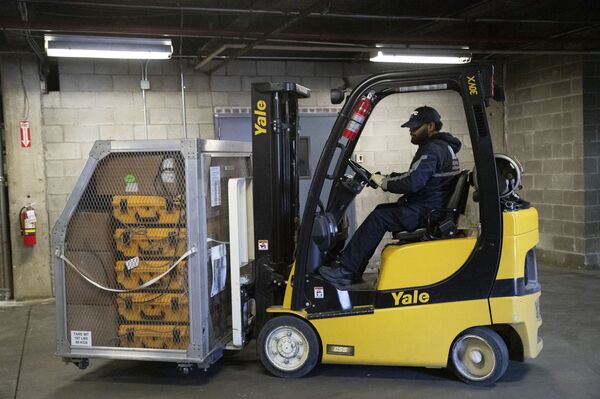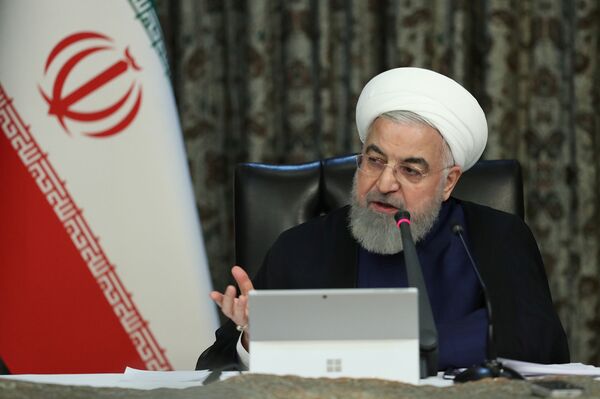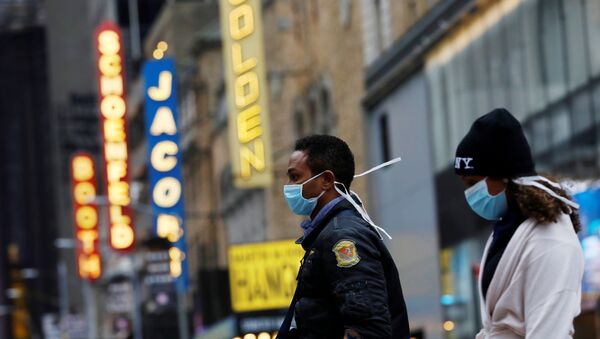The COVID-19 pandemic that has spread worldwide and sent states scrambling to enforce lockdown protocols and adopt measures to prop up their economies in the fallout from the epidemic may have affected the rhetoric of world statesmen, but has not had much impact on international politics.
This is evidenced by Moscow’s repeatedly unheeded calls to set aside trade wars and lift unilateral sanctions at least for the duration of the common adversity.
The question arises whether this policy has any chance of succeeding in the near future.
Championing Sanctions-based Policy
On 2 April the United States, the European Union, the United Kingdom, Ukraine and Georgia blocked a Russia-drafted UN General Assembly resolution calling for solidarity and casting aside trade wars and sanctions adopted without a UN Security Council mandate to ensure equal access to food and medication for nations in the face of the coronavirus pandemic.
Deploring the move, Russia’s permanent mission to the UN regretted that “a small group of states championing sanctions-based policy appeared unready to respond to the call of the UN Secretary-General and refused to cast aside politicized approaches and interests."
Russia pressed the removal of the US unilateral sanctions on Iran as the country was wrestling with a lack of medical equipment and medicine it vitally needed to import to battle COVID-19.
On the eve of the voting on the Russia-drafted UN General Assembly resolution, an An-124 Russian military cargo aircraft airlifted much-needed medical supplies, such as lung ventilators, masks, protective gear, disinfectants, etc., to the US on 1 April, as the country remains the nation worst hit by the novel coronavirus disease, with over 278,400 registered cases according to the latest count by Johns Hopkins University, and a death toll of over 7,100.
Commenting on the aid delivery, which in part was funded by the US side and in part by the Russian Direct Investment Fund — a government sovereign wealth fund that has been subject to US sanctions for alleged Ukraine-related activities since 2015, the US State Department said that it was now time to "work together to overcome a common enemy that threatens the lives of all of us".
During a press briefing on COVID-19 at the White House Donald Trump said:
“It was a very nice gesture, on behalf of President Putin, I could have said no thank you, or I could have said thank you... I said, I'll take it… He offered a lot of medical high quality stuff that I accepted. That may save a lot of lives".
As the ventilators delivered by the Russian plane were unloaded, images showed them to be a model known as the “Aventa-M,” manufactured by a subsidiary of a sanctioned Russian company - the Ural Instrument Engineering Plant (UPZ), Russian media group RBC reported Friday.

UPZ is part of the Concern Radio-Electric Technologies (KRET), which is itself a unit of Russian state defense and technology conglomerate Rostec.
Both Rostec and KRET on the US sanctions list since 2014, with US firms and nationals barred from doing business with them. The gesture begs the question: is now not the right time to revise the policy of sanctions?
Missed Opportunity
As the COVID-19 pandemic progressed, UN Secretary-General Antonio Guterres underscored in late March ahead of the virtual emergency G20 summit that it was time for “solidarity not exclusion”, calling for the rolling back of sanctions.
As Guterres explained that by the end of the year the economic fallout from the pandemic would reach trillions of dollars, he was supported by President Vladimir Putin. Russia urged the US to immediately lift Iranian sanctions that prevent Tehran from effectively fighting the new coronavirus outbreak.
Meanwhile, the coronavirus pandemic was an “historic opportunity” for the US to “apologize” for its sanctions against Iran, President Hassan Rouhani said on 1 April.
“Unfortunately, the Americans have not learned much in these tough global conditions, because this was a good time to apologize for their wrongdoing and a historic opportunity to say for once that they are not against the Iranian nation,” Rouhani said at a cabinet meeting.
US has repeatedly imposed Iran-related sanctions against several companies and individuals over their cooperation with Tehran in the field of oil production, accusing Tehran of supporting terrorism.
Iran, for its part, slammed Washington for “economic terrorism” and deplored measures that hinder it from receiving medical equipment and medicines necessary for fighting the virus.
Under Magnifying Glass
According to Andrey Kortunov, Director General of the Russian International Affairs Council, every action taken by Russia is studied by Western colleagues “under a magnifying glass”, in line with the prejudice that Russian proposals are always aimed at “promoting their own narrow interests”.
Many politicians, said Kortunov, believe that a rolling back of sanctions, even in connection with exceptional circumstances, such as those triggered by the emergency conditions of a pandemic, would de facto mean a weakening of Western pressure on Russia.
The expert believes that "technical progress" on certain sanctions is not ruled out despite all that has been said.
"Americans might “turn a blind eye” to some actions of European countries regarding Iran, for example, which under other circumstances would be interpreted as a violation," suggested Kortunov.

As the COVID-19 pandemic progresses, the political background for serious dialogue is negative, according to Andrey Kortunov, albeit there is a shift in priorities due to the pandemic.
While currently no one is ready to abandon sanctions as a substitute for diplomacy, much hinges on how the pandemic develops.
The Director General of the Russian International Affairs Council added that perhaps the time will come when the instinct of self-preservation will outweigh tactical interests.


